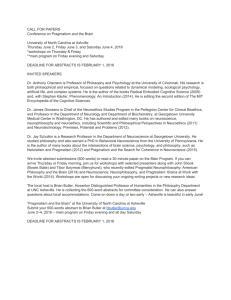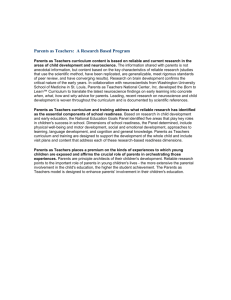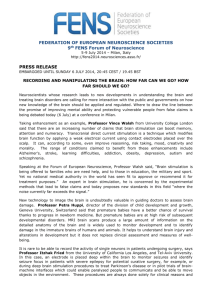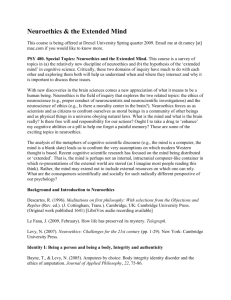THE MIND IS PRONE TO WANDER: CONSCIOUSNESS
advertisement
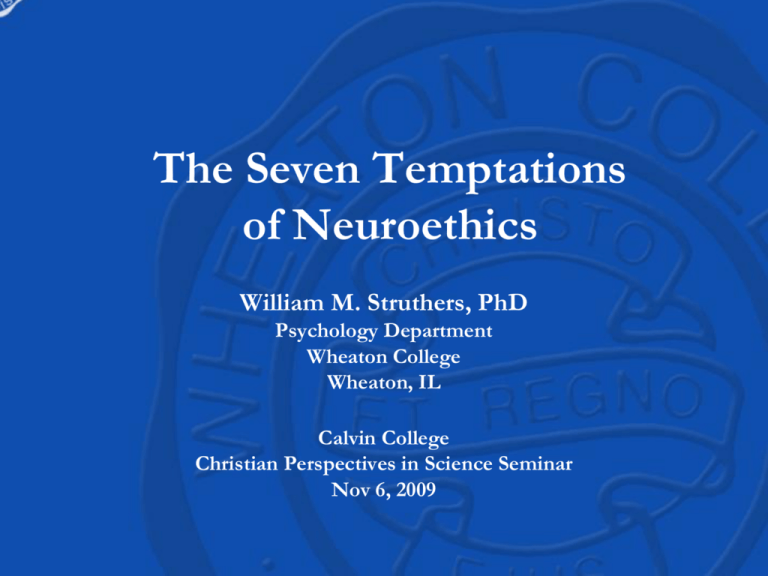
The Seven Temptations of Neuroethics William M. Struthers, PhD Psychology Department Wheaton College Wheaton, IL Calvin College Christian Perspectives in Science Seminar Nov 6, 2009 Neuroethics “Neuroethics is the part of bioethics that considers the intended and unintended consequences of neuroscience in medical practice, research, and society at large. Neuroethics also deals with issues that touch no other area of science – our sense of self, our personalities, and our behavior. And brain science can change these aspects in significant ways.” - Brain Facts, pg. 55-56 Neuroethics BIOETHICS BIOMEDICAL ETHICS NEUROETHICS NEUROSCIENCE RESEARCH ETHICS Dividing Neuroethics • The Neural Basis of Morality and Ethics – Neural Basis of the Self – Theory of Mind • Agency Detection – Mirror Neurons – Behavioral Inhibition – Rationality and Affect in Decision Making • Neurobiological correlates of ‘moral’ states (i.e. guilt, altruism, forgiveness) • Neuroscience Advances on Evaluating Moral Systems – Public Policy • ‘Making’ Life • ‘Taking’ Life • ‘Faking’ Life – Therapy/Enhancement – Education – Marketplace Neuroethics: Mapping the Field • Conference in May, 2002 sponsored by the DANA Foundation Maps of Neuroethics • Tectonic – Fundamental questions of determinism and reductionism • Related to the anthropological and teleological questions • Geographic – Epistemological issues of philosophical, theological, scientific approaches • Related to the ontological questions • Locale – Specific issues that we are interested in and have clearly defined boundaries • Related to the moral questions SFN 'Identified Areas' 1. 2. 3. 4. 5. 6. 7. 8. 9. Need for Ethical Framework Morality Social Behavior Social Policy Genetics Brain Injury Neurological Disorders Informed Consent Environmental Influences What do Evangelical Christians Have to Offer? One Faith: The Evangelical Consensus • Scripture-oriented – Scripture as authoritative guide, rule and map for faith and life. • Christ-centered story of redemption • Orthodox • Devoted to becoming a disciple of Jesus Christ • Spreading the Gospel • Unity in profession, proclamation and pastoral care • Trinitarian – Father (Creation and Providence) – Son (Mediator of Reconciliation, Resurrection, Reconciliation, Redemption, Restoration, and Reward) – Holy Spirit (Fellowship, Sacrament, Comforter, Paraclete) Bebbington’s Evangelical Hallmarks • Conversionism – the belief that lives need to be changed • Born again • Personal relationship with Jesus • Activism – the expression of the gospel in effort • Social, Political and Missional (Evangelism) • Biblicism – a particular regard for the Bible as authoritative • Crucicentrism – a stress on the sacrifice of Christ on the cross Theological Issues • Theological Anthropology – Personhood – Consciousness – ‘Telos’ for Humanity • Morality – Free Will vs. Determinism • Predestination • Calvinism and Arminianism – Legal Responsibility • Moral Status with respect to society/culture and God • The Significance/Problem of Suffering – Why is there suffering? – What is its purpose? Morality Issues • What is the appropriate moral decision? • Where is transcendent truth? • Primary Concern: Epistemological and Ontological – Genetic Fallacy – Neuroscience can tell us about the mechanics of behavioral selection, but very little interesting about morals and religion. A reductionistic perspective will result in medicalization of social issues, neuroessentialism of personhood, and inconsistent value judgments about the morality of specific behaviors. – The ‘rightness’ of any behavior is not dictated by the neural mechanisms that underlie the decision. • B.F. Skinner’s ‘No praise, no blame.’ Convergence Technologies • Use of neuroscience to interface machine and brain • Primary Concern: Anthropological – Reverse Engineering the Brain – Artificial Intelligence – Brain-Machine Interface • Implant Technologies • Augmentation • Specific Evangelical Issues: – Anthropology/Personhood – Eschatology/Resurrection – Dissatisfaction with the Present Where are the Landmines for Neuroscientists? • The Landmines are Philosophical, not Empirical – Teleological • Purpose – Epistemology • Scientific Positivism • Triumphalism vs. Multiplicity/Authority – Ontology • Philosophical Naturalism (Incompatible with Christian faith) – Anthropology • Reductionism (Incompatible with Christian faith) • Determinism • Education • Public Policy • Over-Reaching (Genetic Fallacy) “Neuroethics is not simply a matter for the ethicists or the neuroprofessionals; it must also involve politicians, religious leaders, public policy experts… The issues are simply too important to be left to the scientists.” -Dr. Zach Hall University of California San Francisco The Seven Deadly Sins • • • • • • • Pride Envy Gluttony Lust Anger Greed Sloth Pope Gregory I (540-604) Neuroethical Temptations Temptation: – Trial, testing (I Sam 17:39) – Acts of humanity that challenge God (Deut 4:34) – Deception – doubt, unbelief and rebellion (Gen 3:1-13) – Circumstances – external (James 1:2) Our Response: An opportunity for God to reveal His goodness and provision or exercise our brokenness The Seven Temptations of Neuroethics 1. 2. 3. 4. 5. 6. 7. Human Identity Manipulating Memory Divining the Future Abdication of Responsibility Dissatisfaction with Normalcy Redirection of Development Distribution of Benefits 1. Human Identity Temptation: We define/decide what is human – – – Humanity as Genetics or Neural Systems What is an Individual? (Continuity) Move towards Neuro-essentialism • • • Uniqueness of Human Brain (i.e. mirror neurons, spindle cells) Brain as the Criteria for Life/Death Issues Ignores Cultural Differences Response: God defines/decides what is human – Imago Dei • – Substantive, Relational, Functional Incarnation Beginning of Life Issues • Use of neuroscience for the purpose of: – Determining the detection of life, creation of new life, use of current life • Primary Concern: Theological Anthropology – Embryonic Stem Cell research – Obligation to the ‘least of these’ – All embryonic stem cell research is bad because of the means through which the embryonic stem cells are obtained and for what purpose. End of Life Issues • Use of neuroscience for the purpose of: – Determining the detection of death of the self, reduction of pain and suffering • Primary Concern: Theological Anthropology – Euthanasia – Obligation to the ‘least of these’ – ‘Slippery Slope’ of neuroessentialism Faking of Life Issues • Use of neuroscience for the purpose of: – Interfacing between brain and machine for the purpose of augmentation • Primary Concern: Theological Anthropology – Loss of the uniqueness of humanity – Mechanistic view of humanity – Augmentation as potentially harmful – With augmentation there is a potential for an increase in the capacity for good and evil. 2. Manipulating Memory Temptation: Alter the Consolidation, Recall of Our Life Experience – – – – – Remove Unwanted Memories Implant Desired Memories Effects on Other Cognitive/Affective Systems ‘Clinical’ Relevance – Luria’s mnemonist, PTSD, Legal Punishment ‘Spiritual’ Relevance – Forgiveness, limit God’s healing Response: Allow a proper and clear view of our life so that God’s grace, mercy and love can be given opportunities to be revealed. 3. Divining the Future Temptation: To use neuroscience to affect the future to a desired end – Prediction of outcomes – Neural/Genetic Screening – Coercion (i.e. Domestic Violence risk) Response: Rely on God’s sovereignty and trust in His goodness 4. Abdication of Responsibility Temptation: To be free from restriction and/or responsibility – Emphasis on personal choice/freedom – Expanding legal phenotypes for exculpatory purposes – Deterministic/Mechanistic view of the self – Legitimate Legal Implications (Burn and Swerdlow, 2001) Response: God is just and calls all to accountability based on how each is commissioned, gifted and enabled. 5. Dissatisfaction with Normalcy Temptation: To dictate what is good/desirable and what is not – – – – – – – – What is Pathology? Enhancement/Therapy Desire to be better than good Incompatibilities with other social values Increasing cognitive abilities ≠ increase in the quality of life What kind of person is the goal? Tolerance fades (Grace and Envy) Fuzzy line separating therapy and enhancement Response: Respect the dignity of all. Enhancement and Therapeutic Issues • Use of neuroscience to enhance and cure neurological disorders. • Primary Concern: Anthropological, Teleology – Increasing cognitive abilities does not equal an increase in the quality of life. – What kind of person is the goal? – We actually become less tolerant of those that are not as enhanced as we are (impatient and condescending) or are more advanced (envious). – The line separating therapy and enhancement is fuzzy. 6. Redirection of Development Temptation: To modify our development and – – – – – – – Questions of Permanence Unchanging Neurons Disruption of Development Loss of the uniqueness of humanity Mechanistic view of humanity Augmentation as potentially harmful Redirection = potential increase in capacity for good and evil Response: God’s direction for humanity and for each individual is not restricted to this world 7. Distribution of Benefits Temptation: To determine how benefits derived from neuroscientific advances are provided and delivered to the population – – – – The reality of Capitalism and supply/demand economies Advances only affordable to the wealthy Increases Economic/Social/Global inequalities Who decides? Response: Humanity as community, to serve the underserved – follow Jesus model as Servant to the least of these A Plan for Dialogue 1. 2. 3. The Message should not always be 'NO', but should be a thoughtful 'Be Very Careful'. Society for Neuroscience to recognize the importance of communicating findings to and engaging (inclusively) with religious communities. • Social Issues Committee • Public Information Committee • Committee on Neuroscience Literacy • Education Committee Systematic effort of Christians in neuroscience, theology and philosophy to publish in this area. • American Scientific Affiliation • Christian Neuroscience Society • Center for Bioethics and Human Dignity

